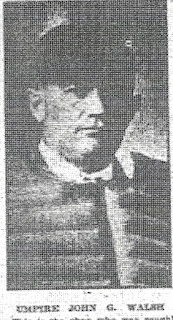“It was a real
exciting game of baseball that Hamilton won at Guelph yesterday, exciting in
more ways than one.”
Hamilton Spectator.
June 9, 1915.
It was an intense
game of baseball between two teams that were definite rivals. As competitive as
the players on the Guelph and Hamilton teams were, the fans from both locations
were equally so.
On June 7, 1915, the
Hams, as they were known, led by their manager Knotty Lee, traveled to Guelph for
the Canadian League afternoon encounter with the Maple Leafs. A large number of
Hamilton baseball fans also made the trip north to take in the game.
The game was
characterized by several lead changes, with both teams making coming from
behind rallies to tie that game after it appeared that each might have been
behind so far that the game was all but over.
The game was
eventually won by the Hams, 6-4, but the action on the field not cease with the
final out.
As described in the
following Monday editions of the Hamilton Spectator, there was more than the
usual intensity present at the contest:
“It was a real
exciting game of baseball that Hamilton won at Guelph, exciting in more ways
than one. There was the usual interest that a good game of ball offers and a
scrap as well, as Umpire Walsh had his troubles in getting out of the grounds with
his life.”1
1 “Hams
Batted Their Way to Victory in Ninth Inning”
Hamilton Spectator.
June 9, 1915.
There had been a few
controversial umpire rulings in the game but it was a call at second base by
Umpire Walsh in the ninth inning that brought matters to a boil:
“The play was a close
one, but some of the members of the Guelph team admitted after the game that
Walsh called the play right, and it looked to some of the more rational fans in
the stand as if his decision was correct.”2
2 “Guelph
Hoodlums Made Matters Hot For Umpire Walsh”
Hamilton Spectator. June 9, 1915.
The Guelph catcher,
Hawkins, immediately disputed the umpire’s call and as the Spectator sports
reporter noted “undertook to tell Walsh that he was several things which are
not defined by Webster.”2
The umpire responded
to the verbal abuse by setting a ten dollar fine right away, and after Hawkins
decided to continue his stream of invectives, Walsh threw him out of the game.
The fans started
cursing and hissing at the umpire but there was only one out in the inning. Just
two batters later, the third out had been recorded and pandemonium ensued:
“Walsh started for
the box office, where he had left his shoes, and was followed by a crowd of
boys. When they started to throw mud, Walsh decided to face the crowd, and he
walked back to the stand. On his way back, he was accosted by a prominent
Guelph businessman, who acted in anything but a gentlemanly manner and who
threatened to do all kinds of things.
“Another fellow, old
enough to know better, broke in and gave Walsh the shoulder, which started more
mud-throwing and a crowd of hoodlums surrounded Walsh. Some of the Hamilton
players went to his rescue, but the Guelph policeman who was at the game,
disappeared as he did not wish to be where there was any trouble.
“In the meantime, the
crowd continued to follow Walsh, and he took refuge in an automobile. The
driver started for the hotel, but not before all the occupants of the car had
been targets for the mud-throwing hoodlums.
“Throughout the
entire trouble, Walsh remained cool, and threatened to hit with his mask the
first man who touched him. The brave business man who had been making all the
threats, made a hasty retreat when he saw that Walsh was game.”2
The Spectator in
reporting the incident condemned it as “ a disgraceful scene, but the blame
must not be credited to the Guelph fans in general, for the hoodlum element,
which is to be found in every city, caused the trouble.”2
The Guelph Advertiser
did comment on the game with some criticism of the fan behavior, but had some
reservations about the umpire’s conduct as well:
“The unseemly riotous
happenings at the Exhibition park are to be deplored – they were entirely
unnecessary and such outbreaks always do the game harm.
“There was nothing in
the actions of the umpire to justify any violence towards him – in fact, no matter
what his umps does can extenuate violence. He erred on several occasions – what
umpire does not? His errors may or may not have cost Guelph the game; even so,
they were only exasperating incidents of a good exhibition of ball.
“It was unfortunate
that the umpire, after traversing a part of the field towards the gate should
have exhibited weakness by turning back towards the players’ benches. The crowd
of children was not alarming, but the action aroused feelings which were
accentuated when the visiting team unwisely rushed to the rescue.”3
3 “Sporting
Comment”

No comments:
Post a Comment